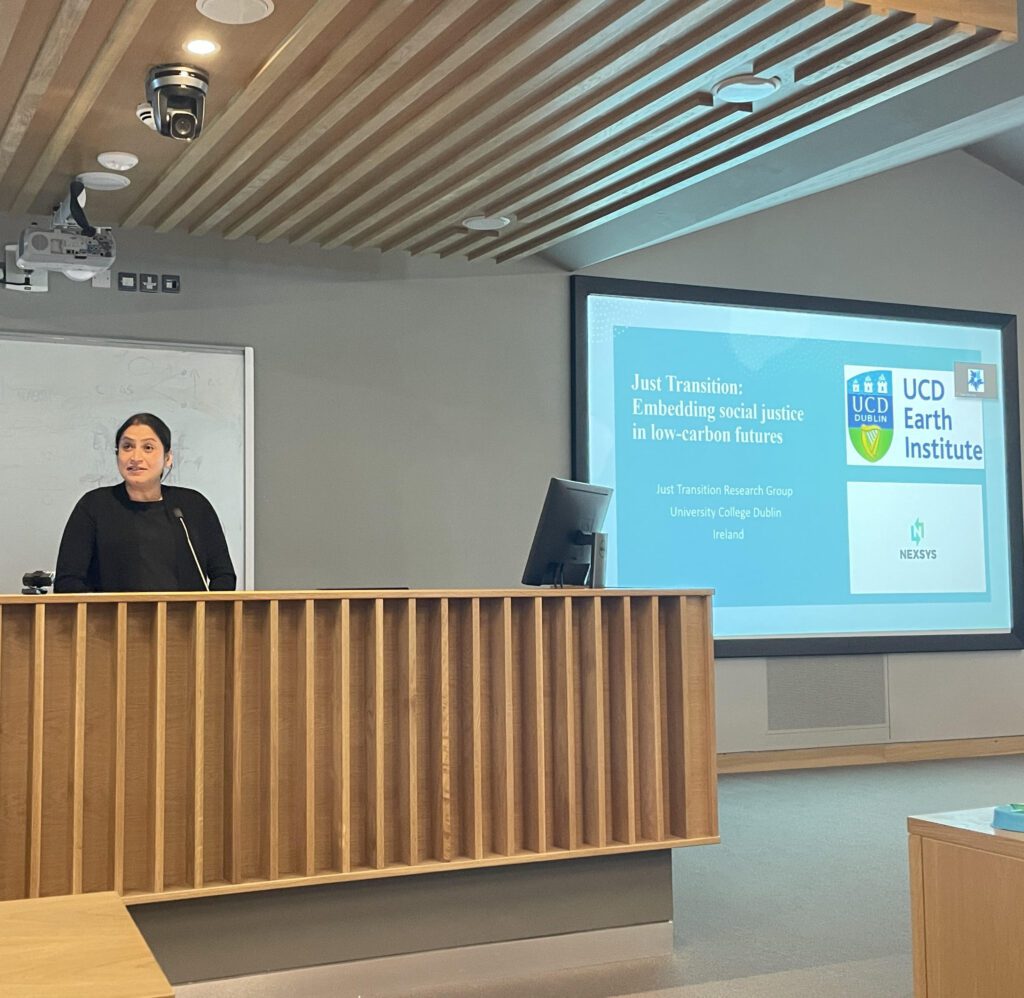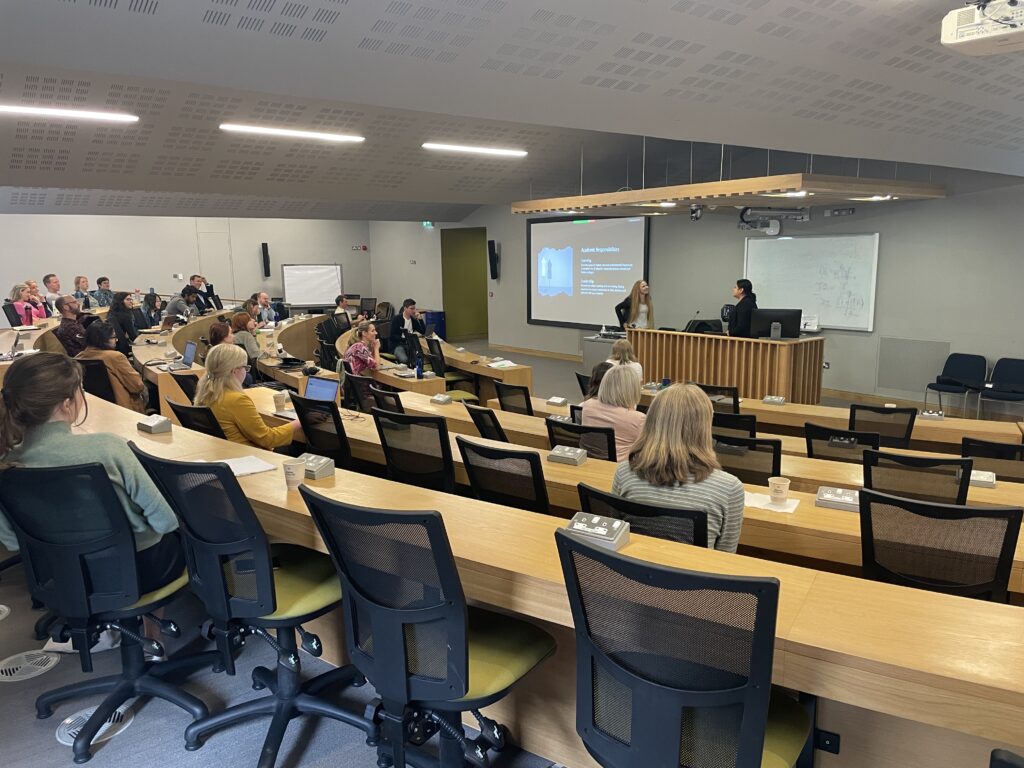NexSys researchers Dr Aparajita Banerjee and Assoc. Prof Geertje Schuitema, who lead the Just Transition Research Group in University College Dublin hosted a half-day conference on just transition in Ireland on 7 June. Dr Banerjee and Assoc. Prof. Geertje Schuitema are both based in University College Dublin’s School of Business and part of the NexSys research partnership.

Dr Aparajita Banerjee opening the conference
The event, also organised by Oscar Mooney, Project Coordinator for the Just Transition Research Group and research assistant at UCD, took place in UCD’s Smurfit Business School Campus and online. It was sponsored by the UCD Earth Institute SPSM Funding Mechanism.

conference
Transitioning to a low-carbon economy requires transformative changes in technology, society, human behaviour, and institutional practices.
The conference facilitated a cross-disciplinary dialogue to encourage integrated and interdisciplinary knowledge and understanding of how a Just Transition to a low-carbon future can be achieved.
Here are some of the questions that were explored:
●How can research on Just Transition contribute to the decarbonisation of our socio-economic systems?
●How can we produce knowledge that can ensure social justice is not compromised during the transition process?
● How can integrated and interdisciplinary research contribute to solving complex societal problems?
Assoc. Prof Schuitema said: “The just transition is a so-called wicked problem, which means it’s very difficult to solve due to its complex, multi-layered and interconnected nature. This is why we need a discussion that includes different perspectives and angles. The fact we heard so many perspectives today is what made this conference really inspiring.”
In rounding up the conference, she also noted some of the common themes that emerged from the discussion, including:
- The need for radical change when it comes to achieving a just transition
- The just transition is an opportunity to reduce existing inequalities
- Solutions must involve and include the communities, workers, farmers and all those impacted on the ground
- The need for institutional change, with well designed bottom-up and top-down approaches.
- The recognition that technological solutions are needed, but also have societal and political implications
- Researchers can play an active role in driving projects, talk to industry and policy makers, and empower communities
A recent publication by NexSys researchers
Policymakers need to include spatial differences to ensure a just transition: a case study from the Irish midlands
A month before the conference, a new paper by Dr Aparajita Banerjee and Associate Professor Geertje Schuitema was published. The paper argued that, in order for a just transition to take place, policymakers need to take into account spatial differences such as different geographies, access to natural resources, and availability and accessibility of socially-valuable resources such as education, healthcare and transport. Spatial differences can exacerbate inequalities, especially when it comes to rural spaces such as in the Irish midlands, the researchers wrote in the paper.
As the world transitions away from fossil fuels, many regions, and especially rural areas, face both economic and non economic losses (including job losses). Policies that help ensure a just transition for impacted communities, people, and regions are usually referred to as ‘just transition’ policies.
The authors examined a case study from the Irish midlands, where industrial peat extraction for electricity production was discontinued after the closure of associated power plants in 2020.
Under the European Union Just Transition Programme, funding of 169 million euro has been allocated to the region until 2030, as well as 22 million euro put in place by the Irish government, to help communities in the midlands impacted by the closures.
Based on documentary evidence and 30 in-person interviews with community members living in Co. Offaly and Co. Longford, close to the power stations and peatlands where extraction was taking place before closure of the industry, community members felt little was done to prepare the region for a just transition, despite evident decline of the industry for many years, the researchers report.
“Preparing a region to be able to provide alternative livelihood options is critical to absorb the shock of the sudden job cuts. These alternative livelihoods should align with what people in the region want so that the characteristics of the space are maintained,” said Dr Aparajita Banerjee.
Locals felt frustrated and angry, and perceived they were not included in the just transition process. Another theme that emerged was a sense of loss which included tangible job losses and intangible losses due to the connection between the peat industry and the local social and cultural fabric.
Based on these findings, the researchers argued that spatial differences, incorporated in the notion of spatial justice, can enhance social justice or injustice, and thus must be accounted for in policy around the just transition. A lack of alternative jobs and industries in the region, due to prolonged underinvestment, was one issue that emerged from the interviews. Rural development must become part of a long-term just transition policy plan, say the authors in the paper.
The research, which was supported by Science Foundation Ireland (SFI), is published in the journal Environment and Planning C: Politics and Space, and is free to read.
For more information:
Just Transition: Embedding social justice in low-carbon futures – UCD Just Transition Research Group
Link to paper
https://journals.sagepub.com/doi/epub/10.1177/23996544231173210
